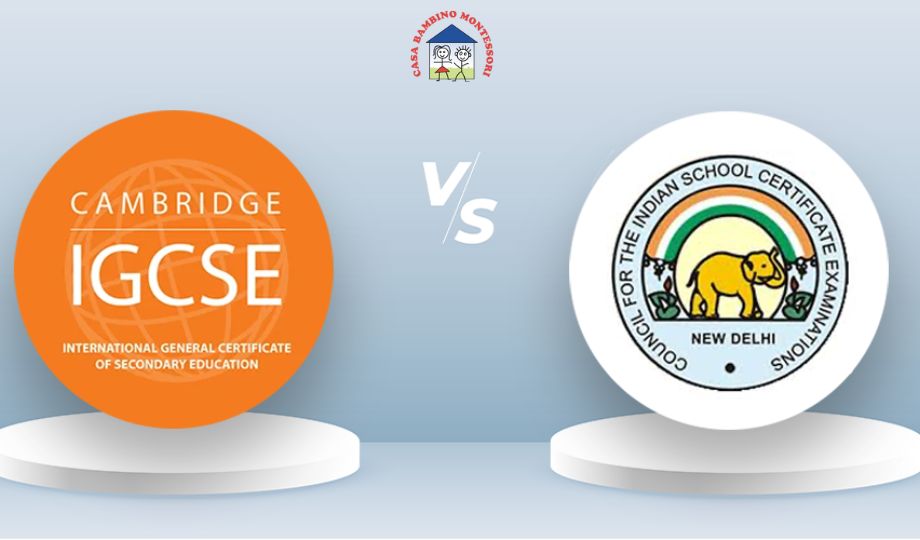
What is the difference between the IGCSE and ICSE Curriculum?
January 16, 2025
The International General Certificate of Secondary Education (IGCSE) and the Indian Certificate of Secondary Education (ICSE) are two distinct educational curricula, each with unique objectives, approaches, and assessments. Here’s a detailed comparison:
1. Governing Bodies
IGCSE (International General Certificate of Secondary Education):
- Administered by Cambridge Assessment International Education (CAIE).
- Internationally recognized curriculum designed for a global audience.
- Offers flexibility for students to pursue further studies in any country.
ICSE (Indian Certificate of Secondary Education):
- Conducted by the Council for the Indian School Certificate Examinations (CISCE), India.
- Primarily designed for Indian students, though recognized by some international universities.
- Focused on Indian educational needs with a mix of international elements.
2. Curriculum Structure
IGCSE:
Wide Subject Choices:
- Offers over 70 subjects, including core disciplines (Mathematics, English, Sciences, Humanities) and unique options (e.g., Environmental Management, Design & Technology, Global Perspectives).
Flexibility:
- Students can choose subjects based on their interests and career goals, with no fixed stream structure.
Focus:
- Emphasis on practical learning, inquiry, and critical thinking.
ICSE:
Subject Range:
- Includes English (compulsory), Mathematics, Sciences, Social Studies, and electives like Computer Applications, Arts, and Home Science.
Balanced Approach:
- Strong focus on core subjects with equal emphasis on languages, humanities, and sciences.
Streamlined Curriculum:
- Less subject flexibility compared to IGCSE, with fixed syllabi for classes.
3. Teaching and Learning Approach
IGCSE:
Application-Oriented:
- Promotes analytical and problem-solving skills.
Student-Centered:
- Encourages independent learning, research, and real-world applications.
Practical Assessments:
- Includes projects, coursework, and exams to evaluate understanding.
ICSE:
Comprehensive:
- Focuses on building a strong foundation in theory and application.
Teacher-Led:
- Traditional methods of instruction with a focus on exams.
Detailed Syllabus:
- Comprehensive and structured, encouraging in-depth study of concepts.
4. Assessment and Grading
IGCSE:
Assessment:
- Includes written exams, coursework, and practicals. Students can opt for Core or Extended levels in most subjects.
Grading:
- Uses a letter-grade system (A* to G). A* is the highest grade.
- Encourages formative and summative assessment throughout the course.
ICSE:
Assessment:
- Primarily based on final board exams for Class 10, with internal assessments in some subjects.
Grading:
- Marks are awarded in percentages. English and the best four subjects contribute to the final score.
5. Recognition
IGCSE:
- Internationally recognized and accepted by universities worldwide, particularly in the UK, US, Canada, and Europe.
- Offers an excellent foundation for advanced programs like IB, A-Levels, or international undergraduate courses.
ICSE:
- Well-recognized in India and accepted by many universities abroad.
- Provides a strong base for Indian competitive exams like IIT-JEE, NEET, and more.
6. Focus Areas
IGCSE:
- Global perspective with flexibility in subject choice.
- Strong emphasis on skills like critical thinking, problem-solving, and global awareness.
- Encourages practical knowledge over rote learning.
ICSE:
- Balanced focus on academics and extracurricular activities.
- Strong emphasis on English, making it an advantage for humanities-based fields or careers requiring strong communication skills.
- Rigorously prepares students for Indian academic paths.
7. Cost
IGCSE:
- Typically, it is more expensive, as it is offered by international schools with higher tuition fees.
- Involves additional costs for international exam fees.
ICSE:
- It is more affordable and widely available in India.
Summary
IGCSE is Ideal for students seeking an internationally recognized curriculum with flexibility and a global perspective, especially for those planning higher education abroad. ICSE suits students aiming for a rigorous Indian curriculum with a strong foundation in English, preparing them for Indian and international opportunities. Both curricula are robust, but the choice depends on the student’s goals, interests, and future educational plans.


